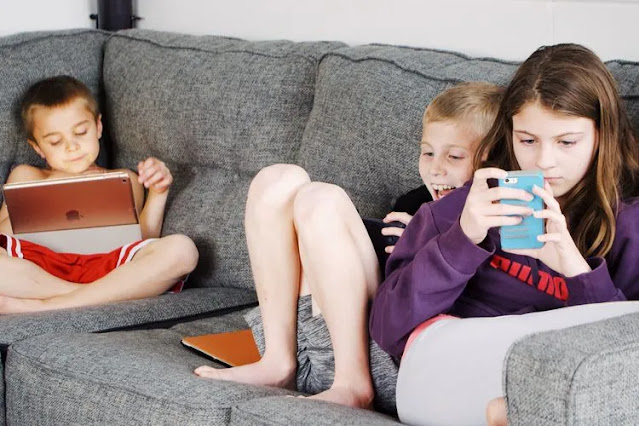For most parents, sometimes we feel annoyed when we see children who are constantly surfing the internet with their gadgets.
Especially with the hours of viewing time so that children forget time to eat, rest, or even hang out with their parents.
Approximately, how often do our children interact and take the time to sit down and chat with us in a day?
If you have very little time, maybe even less than 30 minutes a day and your child doesn't feel comfortable chatting for a long time, then chooses to watch his favorite video on YouTube, is it purely the fault of the internet and gadgets?
Or are we the ones who pay less attention and don't give real examples to children not to surf the internet while interacting with people?
Of course, we all use digital devices to work, have fun, and socialize with people.
But spending too much time in front of a screen can also be harmful, especially for eye health.
There is such a thing as "digital addiction" and it is characterized by an excessive and obsessive attachment to technology, associated with harm to the user and those around them.
Expert Opinion
According to Raian Ali, Visiting Professor of the Bournemouth University College of Science and Engineering on the Channel News Asia page, parents can actually be one of the sources of internet and gadget addiction problems in children.
This study, took a sample of 168 parents of teenagers living in Qatar who then sought to find out the root of the problem such as "is there a relationship between the intensity of internet addiction in parents and children?"
Then, the parents answered the questionnaire given by the researcher.
The questionnaire given is about themselves and their children.
So, what are the results?
The results showed: the more addicted parents are to gadgets and the internet, the stronger the children's urge to follow their parents.
Therefore, if we as parents do not want our children to be addicted to the internet or gadgets, we can also have to set an example in front of them and apply it instead of just telling them without any real action.
Try the following activities to get closer to your children
In order to reduce the intensity of using gadgets and excessive internet access for children, we as parents also need to invite them to interact and do activities together.
This is intended to create a closer relationship between parents and children, even children can also become more comfortable and open with us.
Reported from the Fimela.com page, here are activities that are suitable to do with toddlers:
- Putting the puzzle together
- Playing plasticine (playdough) which also trains children's sensory abilities
- Find and guess objects
- Play object shape matching
In addition to toddlers, there are also activities that we can do to spend time with children who have reached elementary school age or teenagers:
- Play coin toss
- Invite the children to take a leisurely walk in the city park while chatting
- Doing activities through the same hobby with children
- A simple bowling game that can be made at home with used bottles
- Take children on educational tours. We can chat together, educate, and explore children's knowledge about existing objects.
Parents Need To Implement This
Not only telling children, parents also need to provide direct examples so that children can follow our positive habits.
Ali also said related to some attitudes that need to be applied for parents to themselves and to their children.
Talk to the child first
Instead, parents should not just order and immediately stop using their gadgets without giving a clear reason to the child.
What's more, they continue to give punishment if they are caught using gadgets and accessing the internet excessively.
We need to find out first what is the background for them to be addicted to gadgets and the internet excessively.
After we find out, listen to their reasons, and understand, parents can build a mutual agreement with children regarding limitations in the use of gadgets and internet access.
Parental monitoring of children does not only deter children from reducing their addiction.
Change can happen if the child wants to change. A sense of belonging and commitment will empower children (especially teenagers) to feel as though they are in control and make them more willing to take action.
Allow children to decide limits on their digital use (for example, how much time they spend on which devices and mobile apps to delete).
In addition, parents also need to explain the boundaries and what can and cannot be done by the child.
Like, why it can be done and can't be done and its impact. So that children understand more and want to be invited to work together.



